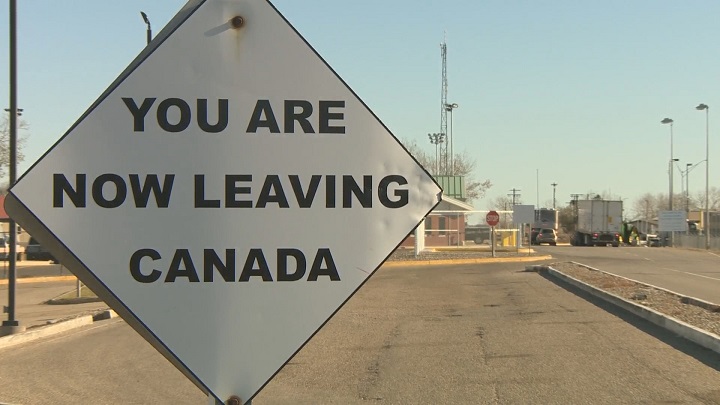It has been 20 months since Canadians were able to drive over to the United States after the border was closed due to the COVID-19 pandemic.

That changed on Monday when Saskatchewan residents were seen crossing the international land border after land travel restrictions were lifted for non-essential travel by the U.S.
Canada reopened its land border to non-essential travellers from the U.S. back in August.
The crossing at North Portal, Sask., about 240 kilometres southeast of Regina, is one of the most active border stations in the province and is expected to be busy as more Saskatchewan residents consider travelling south for the winter months or for vacation.
“Since we do have new restrictions that people are maybe not used to from before the pandemic, the duration when you’re coming through might be longer than you’re used to,” said Sherese Tardif-Cress, a border services officer with Canada Border Services Agency (CBSA).
Tardif-Cress mentioned that it’s a streamlined process as long as motorists arrive prepared and anticipate possible delays.
Those requirements include full vaccination against COVID-19 in order to be allowed to cross into the U.S.
When returning to Canada, Canadian citizens, permanent residents of Canada and Canadian-registered Indigenous people will not be refused entry into Canada if they are not vaccinated. However, those travellers will need to complete COVID-19 tests provided by CBSA and follow quarantine protocols if necessary.

Tardif-Cress said travellers should be aware of random tests being handed out to people crossing the border — even if they are fully vaccinated and have completed their test before approaching the border.
“It’s based off of a system-generated random selection process,” Tardif-Cress stated. “If they are selected for the random test, there is no need to quarantine unless they get that positive result. So don’t be surprised if you get selected to perform another test which will be provided to you at no cost to yourself.

Get breaking National news
“We’re excited to have you travel and we’re even more excited to welcome you back to Canada.”
Quiet start to border opening
Val Voth, an employee at the duty free store in North Portal, said it was a quiet start to the day on Monday, but she expects traffic to pick up sooner rather than later.
She thinks others are waiting until there are changes to rules or they are uncertain about travel at this time.
“We’ve had a few going down to see grandchildren that they haven’t seen for two years, while a few we’ve seen are going down to Texas for the winter,” explained Voth.
She admitted she has heard some complaints from travellers regarding the testing requirements in order to come back to Canada, but simply said that “rules are rules.”
Voth added there is some confusion over the international travel rules among travellers, which she hopes will be cleared up soon.
“We’re hoping to see lots of traffic going down, but it has been kind of slow.”
‘Looking forward to it’
One Saskatchewan community which benefits from U.S. travellers is the city of Estevan, Sask.
Mayor Roy Ludwig said on Monday that he is delighted by the reopening of the land border as he anticipates it will be a positive economic move for communities on both sides of the boundary.
“We have a pretty good percentage of our people that go down (to the U.S.) to either camp, have a second home or a lease accommodation,” Ludwig suggested.
“The border communities are happy for the extra business. It’s a win-win and we appreciate the border finally opening.”

Ludwig said there hasn’t been as many American travellers coming up as they expected since the Canadian border opened in August, however, he thinks it will resume in no time.
The mayor also said he’d like to see the PCR test requirement to enter Canada be dropped as long as a person is double vaccinated.
He called it an added hassle which is deterring some people from travelling.
“People don’t want the headache and the added expense of getting the test,” Ludwig mentioned. “We hope as the numbers go down that the government will dispense that. I know a lot of mayors of border towns right across Canada feel the same way.”
— with files from Eric Stober and The Canadian Press








Comments
Want to discuss? Please read our Commenting Policy first.